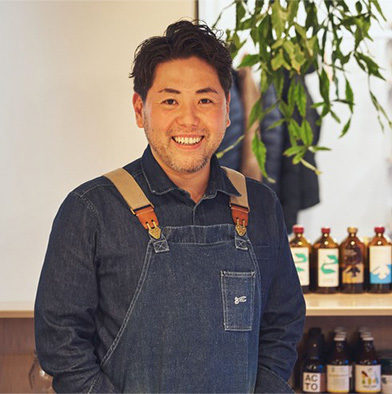Ryousuke Tsutsumi opened his first restaurant, Ri.carica, serving casual Italian cuisine, near Gakugeidaigaku Station, and currently operates six restaurants in Tokyo. As someone who began his business in the suburbs, rather than the city, what are his views on new restaurant styles? He discusses his obsession for natural wine and chemical-free vegetables, as well as the connections to regional Japan and the world that are only possible in Tokyo.

A restaurant that feels like coming home.”
“Why did you choose to open your restaurant in suburbia instead of the city?
I opened Ri.carica at Gakugeidaigaku Station 10 years ago, when I was still 34. Before that, I mostly worked at places within the Yamanote loop—upmarket areas such as Nishiazabu, Ebisu, and Shoto in Shibuya. After I turned 30 until I branched out independently, I worked in Komazawa, which is more of a “bed town” for commuters. Diners felt as though they were coming home, and that atmosphere gave me a sense of satisfaction. That led me to open in the Gakugeidaigaku Station area which, while it’s outside the Yamanote loop, still has a lot of foot traffic, and residents with sophisticated tastes.
I wanted to offer a casual Italian dining experience, but with refined dishes. Also, I really hoped to introduce diners to the appeal of unique natural wines. I think I became strongly attached to the area as a result.
I heard that Ri.carica means to refresh or recharge—what was your intention in the name?
To me, a restaurant is an integrated work of art. I often tell staff that we are “coordinators.” We coordinate delicious food and service, of course, but also provide diners with a wine selection and the producers’ stories. It’s important that we create an atmosphere that customers can enjoy as a whole.
I’m fussy about serving delicious and natural foods that harmonize with and recharge the body when you’re tired. I want to serve food that people can eat any day of the week, but I also want it to feel special. My hope is that this total experience from the dishes to the atmosphere helps customers feel revitalized.
Tokyo can connect with any region because it lacks a sense of regionalism
When I dined at Ri.carica, I noticed a strong team spirit among the staff.
Thank you for saying that. Well, we now have six restaurants, and up until the fifth, we operated entirely with full-time employees. We didn’t expand by grabbing chefs from other establishments—the stores grew organically along with the staff . The business got bigger as our colleagues developed. That might be the reason why, even from the outside, the comradery and team spirit of the staff is evident.
I used to play soccer, which is probably why I have a strong sense of team work. Doesn’t it feel amazing to get a goal as a result of everyone’s combined effort? To a degree, I operate my restaurants with that youthful spirit. Some days it feels like the staff passed the ball in a good cycle, and all of our customers were satisfied. I think it’s important to have as many days like that as possible.
- I definitely feel that kind of fun when I visit Ri.carica. Do you have any secret to creating such a strong team spirit?
I have a strong sense of empathy—if I see someone who is sad it makes me sad. So I tend to talk things through.
Also, in the 10 years since I first opened Ri.carica, I’ve kept on my toes, always trying new things. I think the staff really got on board with that, which is how we became what we are now. We have staff, especially chefs, who have been with us since the early days. I’m very conscious of building a company where I would want to work myself. I can say this now, but I think in the past I wasn’t such an approachable boss.
Lastly, what are your thoughts about Tokyo dining and its potential?
The food and beverage industry is suffering a chronic labor shortage—I’m constantly thinking of how I can attract more youth from regional Japan to work in Tokyo’s restaurant scene.
I believe that Tokyo lacks a sense of regionalism, which means it can connect with any region. For example, when you visit a regional restaurant, it’s like you enter another world. This relates to the concept of “produce locally, consume locally,” which I find very appealing. But the flipside is, it creates constraints on those chefs. They are expected to use local ingredients. But because we don’t have such local loyalty, we can use a full range of ingredients. We can “visit” different regions and connect to their ingredients. Basically, we can represent “Japan.” Our lack of regionalism leads to diversity, which provides more opportunities—that’s how I feel about Tokyo.
We stock natural Italian wines, and now we can contact the producers anytime online. These days, the sense of distance between Tokyo and regional Japan has also reduced, and it’s easier to experience a range of ingredients—that’s for sure. Tokyo has a sense of being able to “travel anywhere.”




